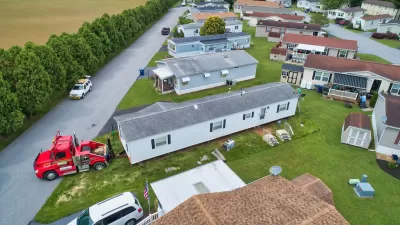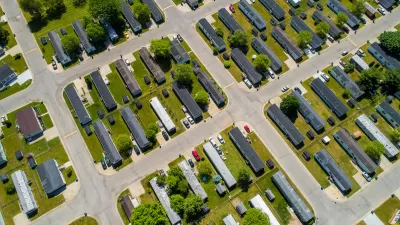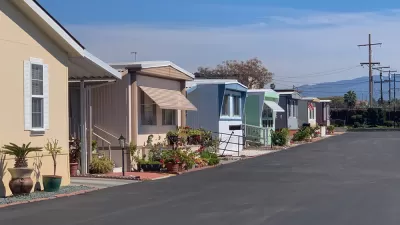Manufactured homes can be an affordable and accessible solution to the housing crisis, but they’re zoned out of many U.S. neighborhoods.

In an opinion piece in The Ledger, L.A. “Tony” Kovach calls on cities in Florida and elsewhere to loosen zoning restrictions that limit where manufactured housing, which can cost half as much as site-built homes, can be placed.
In many U.S. cities, zoning codes restrict where manufactured housing can be placed, often relegating it to the edges of towns and areas isolated from transportation and services. Yet manufactured homes can offer safe, affordable, secure housing and higher density than many single-family neighborhoods. “Unlike conventional housing, many could buy a manufactured home on privately owned land with FHA, VA, or USDA financing for about the same payment as a rental.”
According to Kovach, the 2000 Manufactured Housing Improvement Act allows the federal government to preempt local zoning rules that bar manufactured housing, though this “enhanced preemption” is rarely used. Kovach argues for more widespread enforcement of this rule, pointing to the success of accessory dwelling units (ADUs) in California after the state legalized their construction as a model for manufactured housing, which he argues could similarly help boost the housing supply and provide affordable units for individuals and families.
FULL STORY: Opinion/Commentary: Governments should lighten up on zoning for affordable manufactured homes

Alabama: Trump Terminates Settlements for Black Communities Harmed By Raw Sewage
Trump deemed the landmark civil rights agreement “illegal DEI and environmental justice policy.”

Study: Maui’s Plan to Convert Vacation Rentals to Long-Term Housing Could Cause Nearly $1 Billion Economic Loss
The plan would reduce visitor accommodation by 25% resulting in 1,900 jobs lost.

Planetizen Federal Action Tracker
A weekly monitor of how Trump’s orders and actions are impacting planners and planning in America.

Waymo Gets Permission to Map SF’s Market Street
If allowed to operate on the traffic-restricted street, Waymo’s autonomous taxis would have a leg up over ride-hailing competitors — and counter the city’s efforts to grow bike and pedestrian on the thoroughfare.

Parklet Symposium Highlights the Success of Shared Spaces
Parklets got a boost during the Covid-19 pandemic, when the concept was translated to outdoor dining programs that offered restaurants a lifeline during the shutdown.

Federal Homelessness Agency Places Entire Staff on Leave
The U.S. Interagency Council on Homelessness is the only federal agency dedicated to preventing and ending homelessness.
Urban Design for Planners 1: Software Tools
This six-course series explores essential urban design concepts using open source software and equips planners with the tools they need to participate fully in the urban design process.
Planning for Universal Design
Learn the tools for implementing Universal Design in planning regulations.
Caltrans
Smith Gee Studio
Institute for Housing and Urban Development Studies (IHS)
City of Grandview
Harvard GSD Executive Education
Toledo-Lucas County Plan Commissions
Salt Lake City
NYU Wagner Graduate School of Public Service





























